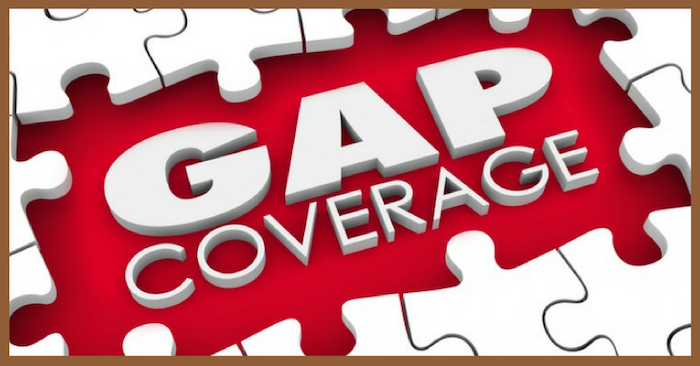New cars have unique advantages like significant manufacturer’s warranty, up-to-date technology, and of course the “new car smell.”
But according to Carfax, a new car loses somewhere between 9 to 11 percent of its value the moment it’s driven off the lot. This is one reason to consider purchasing Guaranteed Asset Protection (gap) insurance.
What is Gap insurance
Gap insurance is an optional type of car insurance that bridges the “gap” between what your standard insurance will pay and what you still owe on your car loan or lease, in the case your car is totaled or stolen.
Since cars depreciate quickly, if they’re totaled soon after purchased, your standard insurance may only cover the actual cash value of the car.
This may be significantly less than your outstanding loan balance. Gap insurance is meant to help cover that difference. But sometimes gap insurance does not cover everything.
5 reasons gap insurance might not fully cover your car
1. Negative Equity. Gap insurance helps cover the difference between the car’s actual cash value and the amount you owe on the loan. If you owe more on your loan than the car is worth (negative equity) or (upside down on your), gap insurance may not cover the whole difference.
2. Policy Exclusions. Gap insurance policies have various exclusions including:
- Commercial Use: If you use your car for commercial activities like ride-sharing or deliveries, standard gap insurance might not cover it.
- Modifications: Extensive modifications to your car can decrease its value, affecting the amount your gap insurance would pay.
- Prior Damage: If your car had existing damage before the accident, the gap coverage might be reduced.
3. Deductibles. Some gap insurance policies may have deductibles that you need to pay before the coverage kicks in.
4. Policy Limits. Gap insurance policies often have a maximum payout limit. If the difference between the car’s ACV and your loan balance exceeds the limit, you may still be responsible for the remainder.
5. Delayed Purchase of Coverage. If you didn’t purchase gap insurance when you initially bought the car or financed it, your coverage might be limited or not available at all.
How to purchase gap insurance
Gap insurance is considered optional coverage and typically only available for new or recently purchased used cars that are financed or leased. Insurers often have age and mileage limits on vehicle eligibility. You have to choose to add it to your policy, and it usually costs extra. Insurance costs could add up quickly, especially if you have poor credit and the insurance company utilizes credit-based car insurance rates.
Why dealerships aggressively offer gap insurance
Most dealerships do offer gap insurance. It’s often presented as an additional product you can purchase when financing or leasing a car. However, you’re not obligated to buy gap insurance from the dealership. You can often find more affordable options through your regular car insurance company. Car dealerships might be particularly pushy about selling gap insurance:
- Profitability. Gap insurance can be a significant source of profit for dealerships. Because it’s optional coverage, the dealership has more flexibility in setting the price compared to mandated car insurance.
- Commission. Finance managers often earn commissions on gap insurance sales, creating a direct incentive for them to push the product.
In defense of dealerships, gap insurance can come in handy. Gap insurance protects the dealership’s financial interest as well. If a car is totaled early in the loan and the insurance payout isn’t enough to cover the remaining loan balance, the dealership may have trouble repossessing the car and could lose money. By selling gap insurance, they mitigate this risk.
Reasons gap insurance may not be necessary
If you make a large down payment, have a short loan term, or buy a car that holds its value well, you might not need gap insurance. The car’s value may stay ahead of your loan balance, eliminating the need for this extra coverage.
According to KBB’s annual Best Resale Values data the top vehicles that retain at least 54% of their value after 60 months are mainly trucks and sports cars.
Scenario where gap insurance would be beneficial

Debt left over from gap insurance can end up in collections
Unexpected debt from gap insurance not fully covering your car can end up at a collection agency. Here’s how:
The Remaining Balance. If your gap insurance doesn’t cover the entire difference between your car’s value and the loan balance, you’re still responsible for the remaining debt.
Lender’s Actions. The lender who financed your car loan will try to recoup the outstanding balance. If you don’t pay, they may take several actions:
- Repossession. Depending on your state laws, they might be able to repossess any other assets you used as collateral.
- Sell the Debt. They could sell the remaining debt to a collection agency.
- Collection Agency Tactics. Collection agencies can use various methods to contact you, potentially including phone calls, letters, and wage garnishment (in some cases). They may also report the debt to credit bureaus, harming your credit score.
To avoid landing at a collection agency contact your lender and try to work out a payment plan. Ignoring the problem will only make it worse. Seeking legal advice might be helpful if the debt does go to collections.
Final thoughts
If you’re plan to purchase gap insurance, shop around for the best price and terms. While gap insurance is not mandatory, it’s most beneficial when you’re likely to end up “upside-down” on your loan.
















